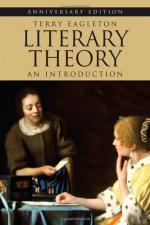
|
| Name: _________________________ | Period: ___________________ |
This test consists of 15 multiple choice questions and 5 short answer questions.
Multiple Choice Questions
1. Why do feminists embrace the work of Jacques Lacan, despite the fact that he was contemptuous of the women's movement?
(a) Because Lacan rejected Freudianism.
(b) Because Lacan taught Freudianism.
(c) Because Lacan rewrote Freudianism.
(d) Because Lacan embraced Freudianism.
2. How did post-structuralism respond to France's student movement's failed attempt to break state power?
(a) Post-structuralism sought to break state power.
(b) Post-structuralism sought to create a free language.
(c) Post-structuralism sought to create a more powerful language.
(d) Post-structuralism sought to break the structures of language.
3. According to Eagleton, the women's movement is not just about women having equal status and power as men, it is what?
(a) The rejection of men's status and power.
(b) The abdication of sex altogether in relations of status and power.
(c) The acceptance of sexual difference in relations of status and power.
(d) The questioning of all status and power.
4. The English philosopher J. L. Austin saw language as what?
(a) Pejorative.
(b) Penultimate.
(c) Performative.
(d) Progressive.
5. The modern history of literary theory has been characterized by a flight from what?
(a) False doctrines.
(b) Real history.
(c) Absolute morality.
(d) Shifting ideas.
6. What is NOT a material reality in the oppression of women?
(a) Unequal wages.
(b) Motherhood.
(c) Equal wages.
(d) Job Discrimination.
7. In structuralism, the relationship between the sign and what it refers to is what?
(a) Identical.
(b) Arbitrary.
(c) Necessary.
(d) Opposite.
8. What three neurotic symptoms can a person develop that are the result of internal conflict, according to Sigmund Freud?
(a) Obsession, phobia, and depression.
(b) Fatigue, pain, and depression.
(c) Pain, hysteria, and fatigue.
(d) Obsession, hysteria, and phobia.
9. According to Eagleton, what is the disadvantage of claiming literature as more valuable and rewarding than other texts?
(a) Because it is no longer true.
(b) Because it is untrue.
(c) Because it partly true.
(d) Because it is true.
10. What is a belief in "ultimate word, presence, essence, truth, or reality"?
(a) Technocentric.
(b) Egocentric.
(c) Logocentric.
(d) Phallocentric.
11. According to Eagleton, if structuralism examined the "product" of literature, but left out what?
(a) The immaterial conditions that produced literature.
(b) The material conditions that produced literature.
(c) The material conditions that destroyed literature.
(d) The immaterial conditions inherent in the product.
12. What text did Tzvetan Todorov attempt a grammatical analysis of so that the characters were nouns, their attributes adjectives, and actions verbs?
(a) Dostoevsky's "Crime and Punishment."
(b) Twain's "Tom Sawyer."
(c) Updike's "Rabbit."
(d) Boccaccio's "Decameron."
13. According to Sigmund Freud, what is the process by which human beings cope with desires they cannot fulfill by directing them towards a more socially valued goal?
(a) Sublimation.
(b) Transference.
(c) Repression.
(d) Idealization.
14. What is the "final logical move" for literary theory, according to Eagleton?
(a) To distance itself from the text.
(b) To recognize that it is an illusion.
(c) To privatize theory for the general public.
(d) To subjugate literature for its own ends.
15. What is the "impotence" of liberal humanism a symptom of, according to Eagleton?
(a) Its sense of entitlement in relation to the world.
(b) Its refusal to examine the facts.
(c) Its contradictory relationship to capitalism.
(d) Its absurd claims in the face of suffering.
Short Answer Questions
1. What does Sigmund Freud call the first stage of sexual life?
2. Jacques Lacan argues that like _______ desire emerges from a lack, which it strives to fulfill.
3. In psychoanalytic treatment, what happens during transference?
4. What aspect of Jacques Lacan's work is of particular interest to literary theorists?
5. What are the three points Eagleton notes about the method of structuralism?
|
This section contains 700 words (approx. 3 pages at 300 words per page) |

|




